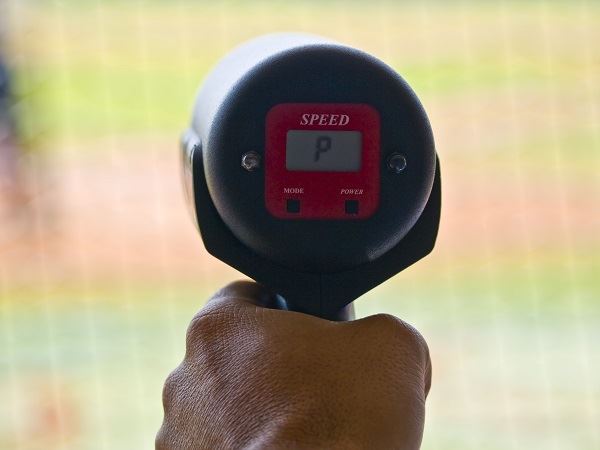 Although other methods of measuring speed are either in production or in
use in California and other states, a radar gun is still one of the most
widely used and most accurate methods used by law enforcement (LE) officers
to substantiate speeding tickets. The reliability of the Radar gun can
diminish over time from its most recent calibration and since an LE officer
must use a tuning fork to keep it up to date can also be called into question
if the officer is not trained on the device.
Although other methods of measuring speed are either in production or in
use in California and other states, a radar gun is still one of the most
widely used and most accurate methods used by law enforcement (LE) officers
to substantiate speeding tickets. The reliability of the Radar gun can
diminish over time from its most recent calibration and since an LE officer
must use a tuning fork to keep it up to date can also be called into question
if the officer is not trained on the device.
How Does a Radar Gun Work?
Quite simply, a Radar gun sends out a radio frequency (RF) signal, which bounces off the vehicle and comes back to the gun. The Radar gun uses a Doppler shift or effect to record the change in the RF signal to determine the speed of the oncoming vehicle. A shift in the RF signal measures the distance between wave crests as it approaches the location of the Radar gun to determine the speed of the approaching vehicle.
What Are Some of the Other Methods Used by LE?
The Light Detection and Ranging or LIDAR method is much like Radar, except that it uses laser technology rather than a radio frequency. This technology uses the speed of sound to determine speed. It is comparable to the effect on your hearing as an approaching storm, you see the lightning before hearing the thunder because the speed of light is much greater than the speed of sound. The laser pointed at a vehicle depends on the formula rate x time = distance and measures the distance several times within seconds to determine vehicle speed.
Visual Average Speed Computer and Recorder or VASCAR are not very accurate due to the possibility of human error starting and stopping the timer and the possibility of other devices using radio waves, such as cellular phones and television signals can interfere with it.
Any system to measure one point on the highway and how fast you get to another point on the highway used solely to determine speed is illegal, such as when an aircraft is used to spot an alleged speeder on the freeway is illegal in CA. One reason this method is illegal is the distance and timing and another is the high possibility of mistaken identity, it may be easy to determine the color of a vehicle from the air but exactly which white car was guilty of speeding may be impossible to determine from the air, so a vehicle pacing the speeder after being identified by the aircraft will make it difficult to challenge.
Challenging a Speeding Ticket
Whether to challenge a speeding ticket in court or not is a decision that should not be made without input from a local traffic ticket attorney. These lawyers sit in traffic court on a near daily basis so they are familiar with what challenges are working and which are not. Hopefully, you did not admit guilt to the ticketing officer, as this could make it very difficult to defend, not impossible, but more difficult. Be sure to tell your lawyer if you admitted guilt, though it will most likely be noted in the LEO’s statement. LEOs are very adept at getting you to admit guilt, everyone has likely heard, “Do you know how fast you were going?” or “You were speeding, weren’t you?” answering yes to either of those questions is an admission of guilt and very hard to dispute in court.
Radar guns, although very accurate, can be challenged if calibration was not up to date, the LE officer’s training was not completed, the weather was bad, or when mistaken identity was possible due to many similar colored cars on the highway. Many will consider the price of a 1-15 mph over the speed limit ticket is only $35 and they should just pay the fine. That is until they find out the real price of that ticket is $230-250 depending on which county you were ticketed in and before an adjustment to your insurance premium for at least three years. Losing your “good driver’s” discount will cause your insurance premium to rise 25% or more depending on your status and your insurance carrier. Since CA insurance companies are not allowed to use your credit rating as a basis for calculating your premium, more emphasis is placed on your driving record. In CA, your basic 1-15 mph over the limit speeding ticket could raise your insurance premium $1000 or more over the three-year period following a conviction. Therefore, that basic speeding ticket is not as inexpensive as you thought it was initially. So, consult a traffic ticket attorney before you decide.
Hire a Neighborhood Traffic Ticket Lawyer
When you require representation in traffic court for a traffic ticket, contact Bigger & Harman, 661-349-9300 for a FREE phone consultation before you decide on what action to take. Send an email to attorney@markbigger.com.
Bigger & Harman are your neighborhood ticket defenders and regularly represent clients in Central Valley CA in traffic courts in Hanford, Bakersfield, or Independence courtrooms in Kings, Kern, Inyo, Fresno and other Central Valley counties, as well as some SoCal counties, such as Riverside, SLO, San Bernardino, and LA County.
En español, llame al 661-349-9755.
